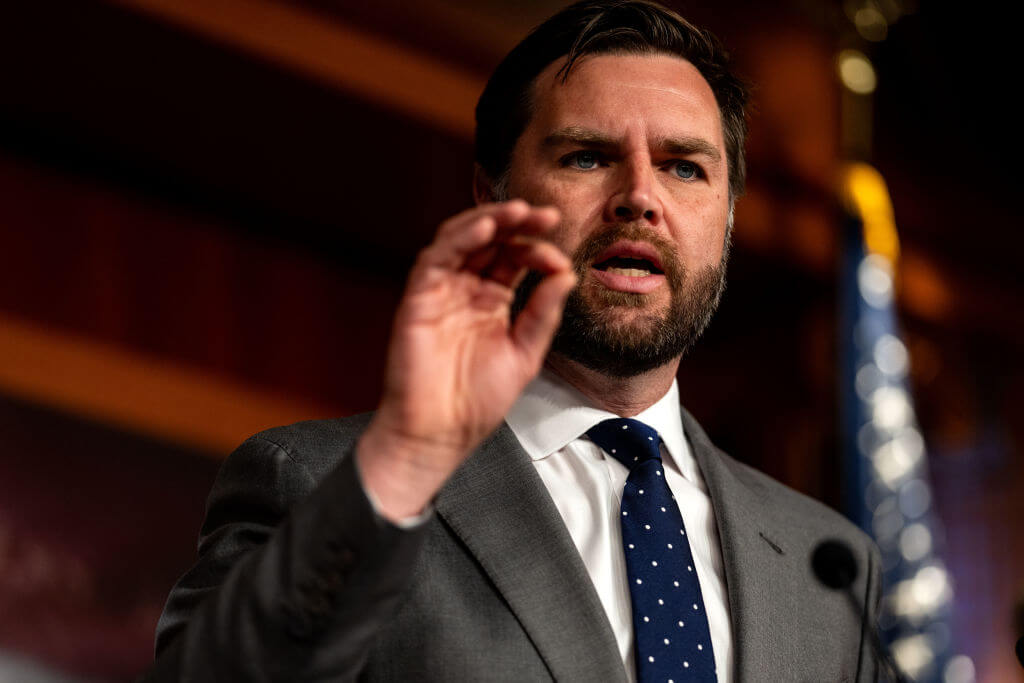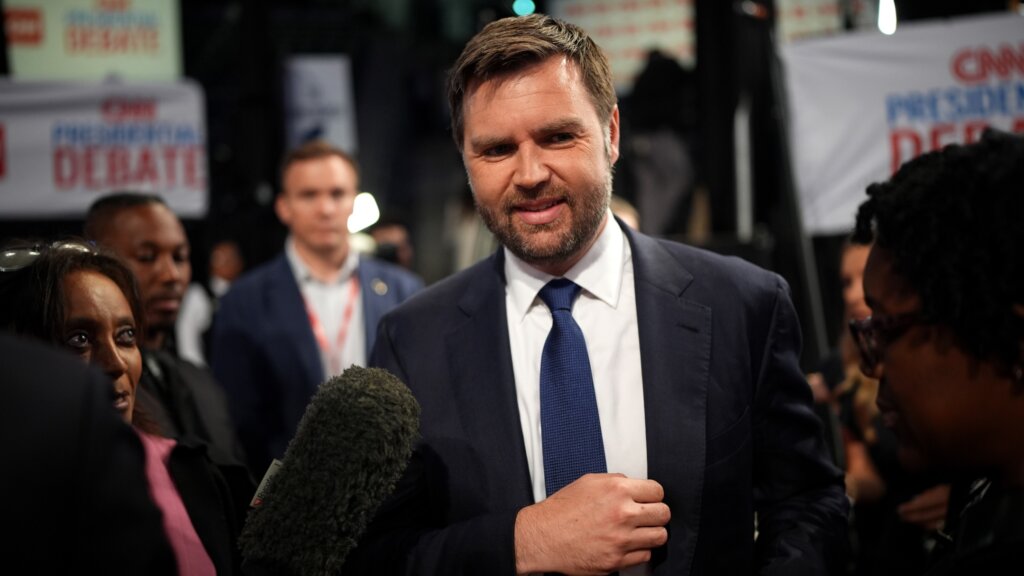What a JD Vance vice presidency would mean for American Jews and Israel
Vance subscribes to Trump’s isolationism, but says the US commitment to Israel must remain strong

Former President Donald Trump and Sen. J.D. Vance, a Republican from Ohio and the vice-presidential nominee, at the Republican National Convention in Milwaukee on July 15. Photo by Getty Images
J.D. Vance will be the running mate of Donald Trump, the presumptive Republican presidential nominee announced on Monday. The choice came 45 hours after a gunman tried to assassinate Trump at a campaign rally Saturday, and on the first day of the Republican National Convention in Milwaukee.
Trump in recent weeks said he was looking for a running mate who could help get him elected and “do a fantastic job as president” following what would be his second four-year term.
Vance, 39, has a colorful backstory. The junior senator from Ohio, and rising Republican star, gained prominence in 2016 with his best-selling memoir Hillbilly Elegy, about growing up in poverty with his drug-addicted mother, played by Glenn Close in the film based on the book. He won a scholarship to Yale Law School and earned a Senate seat in 2022 with Trump’s backing.
A venture capitalist, Vance could help the Trump campaign raise big money to catch up with Democratic fundraising. Last month, he helped coordinate a $12 million Silicon Valley fundraiser hosted by Jewish tech entrepreneur David Sacks. Sacks initially supported Florida Gov. Ron DeSantis for president and moderated his glitchy campaign launch on the social platform X, formerly known as Twitter.
How might Vance appeal to — or repel — American Jews?

Vance subscribes to Trump’s isolationist worldview and could appeal to voters who share his working-class roots in some essential battleground states. He is also a close friend of Donald Trump Jr., who lobbied for his candidacy. At the same time, it indicates that Trump has chosen to appease the “America First” isolationist base over adopting a more traditional Republican foreign policy approach when it comes to Israel and Ukraine. It will also reignite concerns about the Trump campaign’s support from Christian nationalists and people who espouse antisemitic views.
No matter Trump’s choice, American Jews are expected to overwhelmingly vote for the Democrat, as they have historically.
According to recent polls, though none since President Joe Biden’s widely panned debate performance last month, they support Biden over Trump 67% to 24%, a slight shift toward Trump compared to previous years. But Jewish views on Trump’s vice presidential pick could matter to him in key swing states.
Jewish voters are estimated to compose between 1% and 3% of the electorate in Pennsylvania, Michigan, Arizona, Georgia, Nevada and Wisconsin — states that Biden won in 2020 by less than 3%.
Vance’s approach to countering antisemitism

Vance has said that antisemitism must be prosecuted. “If you beat up a Jew and don’t face consequences, the attacks will continue and get worse,” he said in an interview with The Jerusalem Post in 2022.
In response to campus pro-Palestinian protests, Vance introduced a bill that would bar colleges and universities from receiving federal financial assistance if they do not remove disruptive encampments from their campuses. He also said the government should target organizations that fund the protests.
But Vance was also a promoter of replacement theory during the 2022 campaign, versions of which implicate Jews as the orchestraters of a plan to replace white Americans with people of color. He warned of an immigrant “invasion” ahead of the midterm elections to influence the vote.
Vance hasn’t signed up as a co-sponsor of the bipartisan Countering Antisemitism Act, which was introduced in the Senate in April. It proposes the appointment of a new presidential adviser dedicated to antisemitism, separate from Ambassador Deborah Lipsdtadt, who holds a cabinet-level position focused on global antisemitism. The new adviser would also help implement the White House plan to combat antisemitism across agencies. His name is also missing from a similar bill that mandates the Department of Education use the controversial International Holocaust Remembrance Alliance definition of antisemitism, which classifies most anti-Zionism as antisemitic.
Vance might also face media scrutiny for his past negative remarks about Trump, including referring to him as a potential “American Hitler.”
How Vance has responded to antisemitism on the right

Vance has promised to stand by his colleagues, even those involved in scandals or associated with antisemites.
During the 2022 campaign, he defended Rep. Marjorie Taylor Greene of Georgia — who endorsed him — after she attended and addressed a white nationalist conference organized by Holocaust denier Nick Fuentes, saying that she “did nothing wrong.” Vance called her a “friend” and said he watched her remarks and “agreed with nearly every word that she said.” Greene has been accused in the past of making antisemitic remarks — including her suggestion that a Jewish-funded space laser had sparked wildfires in California in 2018. In 2021, Vance, a strong proponent of free speech, criticized X for suspending Fuentes’s account. He declined to condemn Trump’s dinner with rapper Kanye West and Fuentes in 2022.
Vance is also an investor in Rumble, a video platform that has amplified far-right antisemitism and Holocaust denial. Fuentes maintains there an active page featuring his live shows, which are replete with antisemitic and anti-Israel content.
Pennsylvania Gov. Josh Shapiro, who is Jewish and mentioned as a favorite to join the Democratic tickets as vice president, has decried his state’s GOP Senate nominee Dave McCormick’s stake in Rumble, describing it as a site “that gives a megaphone to extremists who spew hate speech and antisemitism.”
Vance recently excused Trump after he repeatedly accused American Jews of disloyalty to Israel and suggested they hate their religion by voting for Democrats. He called it a “reasonable” argument to make in courting Jewish voters. In a speech earlier this year, appearing before a mostly Hasidic and Orthodox audience, Vance said, “In America, we love Jews.”
In 2017, following the deadly “Unite the Right” rally in Charlottesville, Virginia, Vance described white nationalists and “this neo-Nazi movement” as driven by “well-to-do, middle class folks, people who have a good education.” And in response to Trump’s “both sides” comment, Vance remarked that white supremacists are “a small segment” of Trump’s supporters.
During his run for Senate in 2022, Vance suggested that Jewish billionaire George Soros, often the target of antisemitic tropes, would arrange flights for Ohio women to travel to California for abortion if it is banned in his state. Ohio Rep. Casey Weinstein, a Jewish Democrat, said the remark played into “an old antisemitic trope that Jewish people are masterminds that are, in particular, rich and powerful, that are controlling world events behind the scenes.”
Many Jewish Trump supporters may not mind. Trump has invoked the Soros-as-puppeteer conspiracy in dozens of fundraising emails since launching his 2024 presidential campaign.
Vance’s views on Israel and the war in Gaza

As a staunch supporter of Trump’s “America First” agenda, Vance has stridently called out interventionist policies, whether they’re espoused by Democrats or Republicans.
He first visited Israel during the 2022 campaign and criticized U.S. support for the anti-government protests against the judicial overhaul. On Oct. 7, a few hours after the assault on Israel’s south, Vance placed blame for the attack on the Biden administration’s move to unfreeze $6 billion in funds for Iran. “I wish our friends well, but most of all I wish they weren’t fighting against weapons bought with our money,” he posted on X.
In his debut interview as the vice presidential nominee, Vance echoes Trump in calling for a quick end to the war in Gaza“Number one, you want to get this war over and as quickly as possible,” he said on Fox News’ Hannity program, “because the longer it goes on, the harder their situation becomes. But second, after the war you want to reinvigorate that peace process between Israel, Saudi Arabia, the Jordanians and so forth.” Vance accused Biden of prolonging Israel’s war to eliminate Hamas.
Vance said in an interview with Politico earlier this year that he worries Israel might feel compelled to instigate another conflict, given the profound psychological impact of the events on Oct. 7, and compared it to the U.S. invasion of Iraq after 9/11.
He also took a leading role in building opposition to President Joe Biden and House Speaker Mike Johnson’s emergency funding plan for Israel and Ukraine. He accused Biden of using “dead Israeli children” to sell the American public more aid for Ukraine when combining emergency aid to both countries in one vote. He authored a New York Times op-ed headlined “The Math on Ukraine Doesn’t Add Up,” and met with the House Republican Study Committee to whip against the House GOP’s bill. Vance was one of 15 Republican senators to vote against the foreign aid package in April.
In May, Vance explained his strong opposition to Ukraine aid and his commitment to supporting Israel.
“If we are going to support Israel, as I think that we should, we have to articulate a reason why it’s in our best interest,” he said in a speech at the Quincy Institute. “A big part of the reason why Americans care about Israel is because we are still the largest Christian-majority country in the world, which means that a majority of citizens of this country think that their Savior, and I count myself a Christian, was born and died and resurrected in that narrow little strip of territory on the Mediterranean. The idea that there is ever going to be an American foreign policy that doesn’t care a lot about that slice of the world is preposterous.”
This post was updated to include new comments made by J.D. Vance on Israel.

















